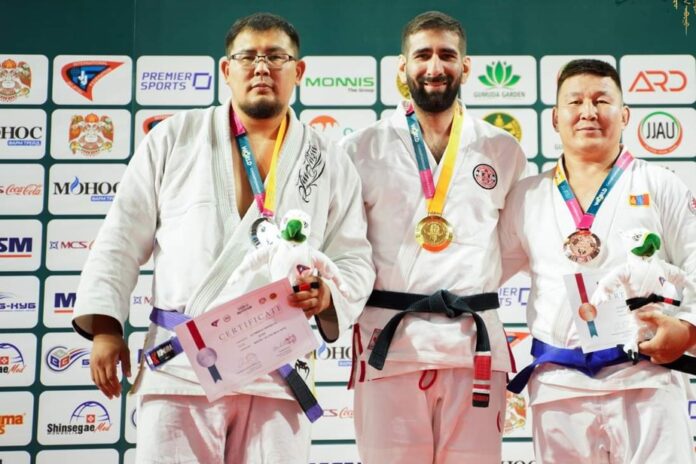In mid-July, Carl Fagnant became both the first Quebecer to reach the podium, and to win a gold medal from the Jiu-Jitsu International Federation (JJIF). Now back home, he intends to do everything to develop the discipline in his native province.
Fagnant spent 11 days in Ulaanbaatar, capital of Mongolia, where he successively defeated four opponents to clinch his JJIF World Championship title in a tournament sponsored by the International Olympic Committee. He was fighting in the Master 1 category, over 94 kg.
On the line, now back in his gym in Montreal East, Carl Fagnant seems calm. Although he gives the impression of not being particularly expressive, there is a discreet smile in his voice when he recounts his experience.
“I had a very good camp, but you don’t necessarily expect it to happen,” he said on the phone with La Presse. “It struck me more coming back, the magnitude of it all. »
Fagnant managed to win his first two fights by submission, against representatives from Romania and Thailand. Then the biggest test of the tournament came in the form of Yerkebulan Altymbekov, a significantly heavier opponent from Kazakhstan. He is the only one to have pushed the Quebecer until the end of the five-minute time limit, ultimately losing on points.
The 34-year-old fighter later pulled off a third submission against his final opponent, a Mongol battling in front of his home crowd. All this, in a weight class that is not usually his own and against a caliber that he describes as “exceptional”.
In jiu-jitsu, the fight always starts standing up. The ultimate goal: to control his opponent in terms of position, even dominate him and if possible obtain a submission.
It is by focusing on his own techniques, on how he can arrive at a comfortable position and not on the opponent, that he manages to have the upper hand.
“Jiu-jitsu is about surpassing oneself. It’s constantly pushing your limits. I’ve been doing it for a long time, but each time I can improve. That’s what drives me,” he says.
Another Canadian, Kevin Wheeler, 36, also won a gold medal for Canada in Ulaanbaatar in the Masters 1 category, under 69kg, during the competition.
On a Canadian delegation of 18 athletes, Carl Fagnant was the only Quebec representative in Mongolia. “I wish we were properly represented. The talent is there, but not the participation,” he laments.
According to him, the cause is quite obvious. In Quebec, jiu-jitsu competitions have just become legal again, after being completely banned by the government since 2017.
So there are followers and talent, but the non-existent competitive structure has discouraged many in recent years.
“It’s frustrating for me as an athlete,” he points out. Finally, the world of Montreal went to Ottawa. We were moving outside to fight against local people. But there are also careers that ended or could have grown more. Our pool has been reduced. »
Encouraging note: a first legal tournament took place at the Pierre-Charbonneau center in July. All the tickets have been sold out, which he said shows a “craze for the tournaments to come back and a way to allow the development of the local scene”.
1st degree black belt, Carl Fagnant is himself the owner of a martial arts academy in Montreal East. He can only be delighted with this news, after a few more difficult years for the sport he loves.
According to him, unlike other martial arts which are steeped in traditional Eastern culture, the roots of jiu-jitsu drive it to continually adapt. Originally Japanese and similar to judo, it was taken up by the Gracie family in Brazil.
“What makes the difference is openness to developments. There is no rigidity in doing this [one way]. Those who do jiu-jitsu will watch judo, wrestling. There is a constant evolution of techniques. »
On a more personal level, the gold medalist is training in order to continue his momentum in international competitions. The European Non-Kimono Championship (late October, Italy), the Pan American Championship (early November, Argentina), and the World Non-Kimono Championship (December, Las Vegas) will all take place before the end of the year.
“The returning tournaments in Quebec make you want to go for victories. »















